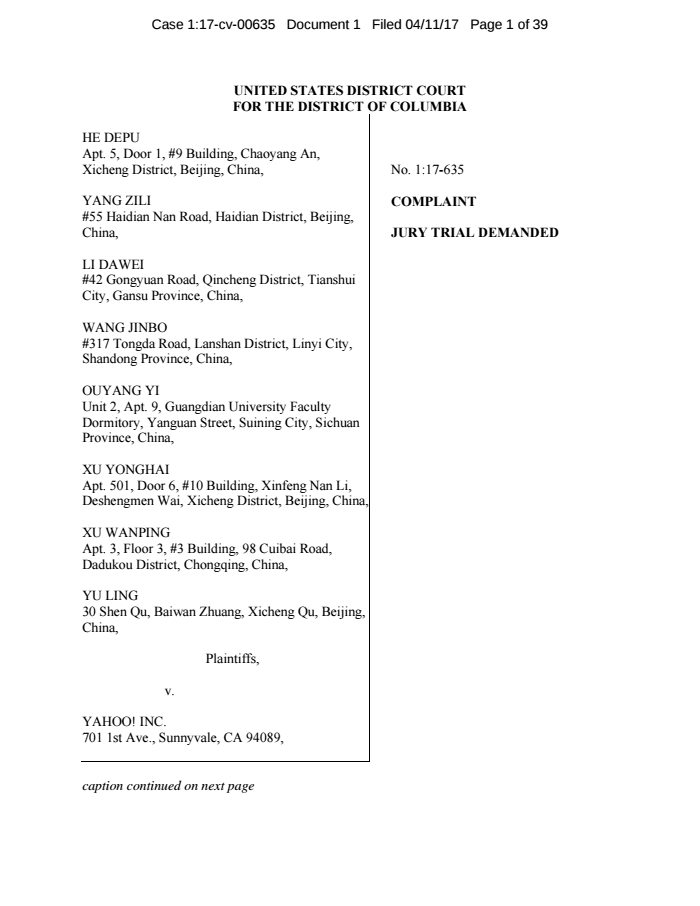
WASHINGTON — A lawsuit filed on Tuesday accuses Yahoo! of mismanaging millions of dollars in trust funds that were supposed to aid Chinese political dissidents.
In 2007, Yahoo agreed to set up a human rights fund as part of a settlement with the families of dissidents who accused the tech company of turning over information about them to the Chinese government. According to the latest court filings, Yahoo paid $17.3 million to establish the fund.
The plaintiffs now suing Yahoo — Chinese dissidents imprisoned in the past for their political activities who say they should have been beneficiaries of the Yahoo funds — say that $13 million of the trust's money is gone, largely spent on expenses unrelated to direct humanitarian and legal aid.
According to the suit, approximately $700,000 of the Yahoo money was spent on providing direct humanitarian aid to imprisoned dissidents over the past decade. Meanwhile, millions more were spent by a Yahoo-funded nonprofit — money that Yahoo was supposed to be overseeing to make sure it was fulfilling its mission— on real estate, salaries, and legal expenses, among other things, the plaintiffs allege.
A Yahoo spokesperson declined to comment. The status of the nonprofit set up to manage and disburse the funds, the Laogai Human Rights Organization, is unclear. The nonprofit doesn't have a website, according to tax documents, and the phone number listed was not functional as of Tuesday morning.
The LHRO disbursed funds to the Laogai Research Foundation — which is also run by Harry Wu — but the foundation's operating status is also unclear. Its website is no longer functional, and the voicemail for a phone number listed on the foundation's Facebook page was not accepting new messages. The Facebook page was last updated in October. The Laogai Human Rights Organization and the Laogai Research Foundation are both being sued, along with Yahoo.
Yahoo faced scrutiny from Congress more than a decade ago after allegations surfaced that the company complied with demands by the Chinese government for information about suspected dissidents. Yahoo, in 2007, settled a lawsuit brought by individuals who had been imprisoned by the Chinese government, agreeing to set up a fund "to provide humanitarian and legal aid to dissidents who have been imprisoned for expressing their views online," according to a statement from the company at the time.
The new lawsuit filed on Tuesday in the US District Court for the District of Columbia accuses Yahoo of abdicating its responsibility to make sure the money was properly handled. Instead, the plaintiffs claim, Yahoo ceded control to the Laogai Research Foundation and its executive director Harry Wu, who died in 2016. According to the suit, shortly before his death Wu told an individual who had applied for funds that the foundation was no longer providing humanitarian assistance to imprisoned dissidents.
"Throughout this entire time, the Yahoo Defendants — whose authorization was needed to make disbursements from the Yahoo Trust — stood idly by, willfully ignoring the mountain of evidence that these expenditures were improper, doing nothing to prevent the systematic unlawful depletion of Yahoo Trust assets, all the while advertising the Yahoo Trust as evidence of its commitment to human rights," the plaintiffs alleged in the lawsuit.
One of the plaintiffs, He Depu, was sentenced to eight years in jail after he was convicted of "inciting subversion of state power," according to the complaint. Depu claims he received less money than he should have from the Yahoo funds as a result of the company's management of the trust. In a translated statement provided by his lawyers to BuzzFeed News, he said, "For the sake of future activists and the broader rights movement in China, we call on Yahoo to do the right thing and stand with those on the frontlines of this fight for civil liberty.”
The New York Times in 2016 reported that in an interview just before his death, Wu denied allegations of misconduct and defended the decision to stop giving grants. Wu said the foundation had difficulty verifying applicants' claims, and he also accused human rights activists who applied for grants of lying.
The most recent tax records available via Citizen Audit, a nonprofit tax record database, for the Laogai Human Rights Organization and the Laogai Research Foundation, show that the LHRO gave $1.3 million to the foundation in 2014. The foundation granted $19,802 for humanitarian assistance that year, in payments ranging from $1,200 to $5,035. The foundation listed the "Yahoo Irrevocable Human Rights Trust" as a related organization.
The lawsuit claims that the foundation spent $4 million on property around Washington, more than $1 million on salaries for Wu and his wife, and hundreds of thousands of dollars on legal fees and expenses over the past decade.
Wu and the Laogai Research Foundation ran a museum in Washington, about human rights abuses in China. According to a 2011 feature about the museum in The Washington Post, a $1 million expansion project was in large part funded by the "Yahoo! Human Rights Fund." A phone number for the museum was disconnected and much of its website was nonfunctional.

